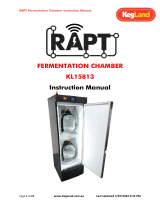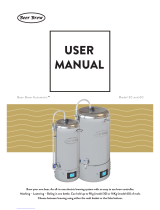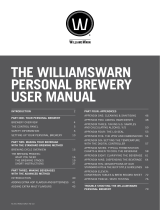
Page 8
CHANGING BETWEEN FERMENTATION AND CRASH TEMP MODE
Once fermentation is complete, you may choose to
perform a cold crash in order to help improve the
clarity of your beer. Cold crashing is the process
of lowering the temperature of the beer inside
the fermenter which then causes yeast and other
particulate to “drop out” and sink to the bottom of
the fermenter. The FTSs Touch includes a separate
mode that allows the user to easily switch between
FERMENT mode and CRASH mode. To do this,
simply press the “CRASH” button on the top of the
screen and the system will switch into crash mode.
Once in crash mode, pressing the SET TEMP
button will take you to the CRASH TEMP screen
which allows you to select from several preset
temperatures or adjust to a specic temperature
using the up and down arrows. All of the factory preset temperatures can be changed to user presets
by adjusting the displayed temperature to your desired temperature then pressing and holding the
preset temperature button that you wish to change.
INSTRUCTIONS
DEFINING USER TEMPERATURE PRESETS
While setting the temperature (on both the FERMENT TEMP and CRASH TEMP modes) there are 3
programmable temperature presets for your convenience.
1. To program a preset, adjust the temperature up or down as desired.
2. Select and hold the desired preset box for 5 seconds. The screen will blink and save the preset.
OPERATING INSTRUCTIONS (CONTINUED)
POWERING OFF THE CONTROLLER
If you should need to turn off your FTSs Touch without unplugging it,
you can press the small black rubber button on the back side of the
unit to toggle the power on/off.
Pressing this button will turn your controller off and stop your
fermentation temperature control. This method of switching the
power off should only be done if the unit will not be used for a
short period of time (one day or less). For long term storage, we
recommend unplugging the main power supply so the entire system
is no longer energized.
POWER BUTTON


















